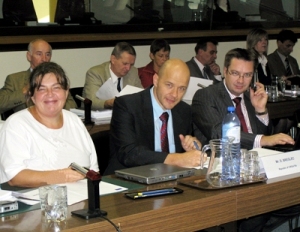


 Today at Brussels, Croatian experts are finalizing the bilateral screening for the chapters 'Transport policy' and 'Transeuropean networks', both very large chapters covering ten or more percent of the European acquis communitaire.
Today at Brussels, Croatian experts are finalizing the bilateral screening for the chapters 'Transport policy' and 'Transeuropean networks', both very large chapters covering ten or more percent of the European acquis communitaire.
A group of 80 experts, lead by the chapters’ main negotiator Miroslav Kovačić, used the past four days to present to the EC the situation and level of alignment as well as the administrative framework for the future implementation of legislation.
Besides Miroslav Kovačić, other leading experts participating in the negotiations are the State Secretary for Transport Dražen Breglec and the head of the Independent Office for European Integration and Transport Policy Romana Palčić, both from the Ministry of the Sea, Tourism, Transport and Development.
Miroslav Kovačić underlined that most of the questions asked be the representative of the EC related to the strengthening of administrative abilities.
'We think that we could satisfy the Commission', said Kovačić, who especially congratulated all members of the work group for a job well done.
Transport policy is a very complex and large chapter of the European acquis communitaire. The legal system of the EU, in the field of transport, expects to improve the functioning of the inland market by supporting effective ecological and user-friendly services. It included technical and safety requirements as well as social standards, demanding a liberalization of the market within the borders of a unified European transport policy.
During the first day of the bilateral screening for this chapter Croatian experts presented the situation and level of alignment as well as the administrative framework for the implementation of legislation in the area of road transport, in issues such as access to transport of goods and passengers by road, provisions on prices and fiscal conditions, social, technical and safety requirements in road transport. Also, presentations were made on provisions of the acquis communautaire which regulate technical requirements for transport of dangerous substances in road transport, rail transport and inland waterways transport as well as the appointment and training of safety advisors.
The second day of screening comprised presentations held by the Croatian delegation on the subject of the structure, administrative and legal framework in the area of rail transport, especially on issues such as access to the market and rail transport infrastructure, standardization of rail company accounts, technical and safety requirements as well as interoperability in rail transport. Also the combined transport structure in the Republic of Croatia was presented.
The third day of the screening was used for the presentation of the administrative framework and Croatian legislation in the area of maritime transport and inland waterways transport. Presentations included regulations on access to the market in maritime transport, the state aid system in maritime affairs, port management, technical and social requirements in maritime transport as well as regulations regarding the crew. Further on, special emphasis was placed on safety regulations such as supervision of the flag state and port state, activities of classification companies, supervision of maritime transport, safety protection of ports, technical requirements as well as regulations on the protection of the marine environment.
On the last day of the screening the legislative framework in the area of state aid and competition rules with special emphasis on the state aid system in maritime, air and road transport. To conclude, Croatian experts presented the situation and level of alignment as well as the administrative framework for the implementation of legislation in the area of air transport.
The same day the Croats introduced to the EC their point of views and activities related to the global navigation satellite system GALLILEO and the administrative and legal framework of the Republic of Croatia in the area of inland waterways transport. They also talked about the inland waterways transport sector as well as the legislation which regulates access to the market, professional qualifications, and safety and technical rules.
Also, as part of the chapter 'Transeuropean network' the representatives displayed the state of the transport and energetic infrastructure, strategic development documents, general rules of planning and construction of traffic routes, an overview of past and future investments, as well as the demonstration of cooperation in the field of developing transport and energetic infrastructure.
Further it has been announced that by the year 2008 Croatia will introduce digital tachographs into new vehicles. New trucks in the EU member countries will have to comply with that requirement, starting with May 2006.
As far as railroad transport is concerned, which is liberalized in the EU, Croatia committed to the obligation to set up a body, which will be in charge of regulating the operating of the administrator of railroad infrastructure.
The most important question of maritime transport includes cabotage – transport of goods and passengers within one country, which according to European guide rules has to be accessible to all ship operators which are sailing under any of the flags of the EU member countries.
According to Miroslav Kovačić, it is possible that Croatia will ask for a transition period related to the question of cabotage.
Croatia is already investing large sums in the modernization of its fleet in order to prepare the domestic ship owners for the future competition arriving from the EU.